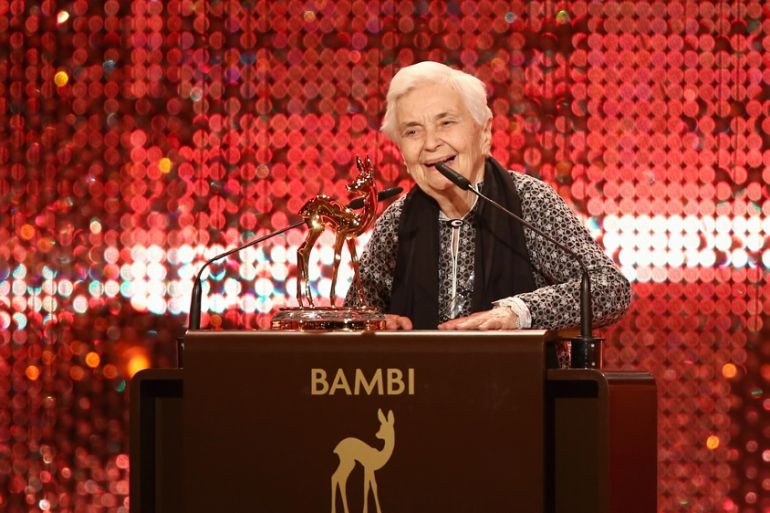Ruth Pfau: Why Google honours her today
German doctor and nun, hailed for her efforts in containing leprosy in Pakistan, would have been 90 on Monday.

Described as a pioneer and hailed for her role in containing leprosy in Pakistan, German doctor and nun Ruth Pfau would have been 90 on Monday.
In her honour, Google is changing its logo in 15 countries to a doodle, or illustration, of her treating a patient.
Below, Al Jazeera takes a look at the story of Pfau, also known as the “Mother Teresa of Pakistan”.
WWII survivor
-
Pfau was born on September 9, 1929, in Leipzig, Germany, to Lutheran parents, Walter and Martha Pfau. She was the fourth of five daughters, and also had a baby brother.
- As a teenager, she barely survived World War II; on the night of December 4, 1943, at the age of 14, she witnessed a bombing that destroyed her house.
-
Later, she was inspired to become a doctor after her baby brother became ill and died.
- After the war, at the age of 19, she followed her father to Wiesbaden in West Germany, where she pursued an education in medicine at the University of Mainz in Marburg.
-
While a student, she met an elderly Dutch Christian woman, a concentration camp survivor, who had dedicated her life to “preaching love and forgiveness”.
- After rejecting a marriage proposal from a fellow student, she was baptised in the Evangelical tradition in 1951, before her conversion to Roman Catholicism in 1953.
-
Following her conversion, she joined the Society of Daughters of the Heart of Mary in 1957 at the age of 28.
-
“When you receive such a calling, you cannot turn it down,” Pfau told the Express Tribune. “For it is not you who has made the choice. God has chosen you for himself.”
A journey to Pakistan
-
The Catholic order sent her to southern India, but in 1960, a delay in her visa meant she had to stay in the Pakistani city of Karachi.
- She travelled to various parts of Pakistan with the aim of rescuing patients who were abandoned by their families.
-
During her visits, she saw patients who suffered from leprosy, a disease that causes discolouration of the skin, sores and disfigurements.
- According to the Telegraph, she recalled watching a young man as he “crawled on hands and feet … acting as if this was quite normal, as if someone has to crawl through … dirt on hands and feet, like a dog”.
-
Realising that treating patients was her life’s calling, she started offering medical care to people in the area.
|
|
‘A pioneer for Pakistan’
-
In 1963, she set up the Marie Adelaide Leprosy Centre. The clinic received patients from all over Karachi and other parts of Pakistan, as well as people from neighbouring Afghanistan.
-
Pfau raised funds to refurbish the clinic, building a network of over 150 medical centres. She also trained doctors and founded Pakistan’s National Leprosy Control Programme in 1965.
-
In 1979, she was appointed as the federal adviser on leprosy to the Ministry of Health and Social Welfare of the Pakistani government.
-
In 1988, Pakistan recognised her work by giving her citizenship.
-
“Dr Ruth was a pioneer for Pakistan who started leprosy control,” Chris Schmotzer, a German physician and a colleague of Pfau, told Al Jazeera in 2017. “She started a programme from scratch, and this is a tough job [but] she was always doing things full-heartedly.”
‘Her heart was always in Pakistan’
-
In 2006, at the age of 77, she gave up the directorship of the leprosy centre, but she continued helping patients and working with government bureaucrats.
- “We are like a Pakistani marriage,” Pfau said. “It was an arranged marriage because it was necessary. We always and only fought with each other. But we never could go in for divorce, because we had too many children,” she was quoted as saying by The New York Times.
-
“She was very nice and an angel for us, she was very kind to the poor and [she] devoted her life to the suffering [of] humanity,” Sabir Khan, a leprosy patient who was treated by Pfau told Al Jazeera in 2017.
‘Pakistani nation salutes Dr Pfau’
-
However, on August 6, 2017 she was admitted at the Aga Khan University Hospital in Karachi due to respiratory problems.
-
She was put on ventilator after her condition worsened, but she refused life support.
-
In the early morning of August 10, 2017, Pfau died at the age of 88.
- Then-President Mamnoon Hussain said in a statement that “Dr Pfau’s services to end leprosy in Pakistan cannot be forgotten.”
- “She left her homeland and made Pakistan her home to serve humanity. The Pakistani nation salutes Dr Pfau and her great tradition to serve humanity will be continued,” he added.
-
While then-Prime Minister Shahid Abbasi said: “Dr Ruth came to Pakistan here at the dawn of a young nation, looking to make lives better for those affected by disease, and doing so, found herself a home. Although she may have been born in Germany, her heart was always in Pakistan.”